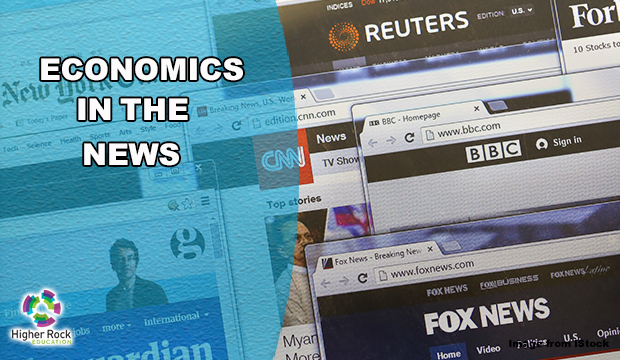
Economics impacts our lives every day. Below are some of the top storylines from this past week related to economics.
o Central bankers are increasingly concerned that big corporate profits are driving persistent inflation. Policymakers are concerned that companies are pushing prices above and beyond what is necessary to absorb higher costs. Profit margins in the eurozone averaged 8.5 percent in the year through March, a decrease from a peak of 8.7 percent in mid-February. Prior to the pandemic, the average margin was 7.2 percent.
The United States has had a similar experience where companies are reporting high profit margins despite the highest inflation in 40 years. Some companies have legitimate reasons for raising prices, such as higher input costs or because they expect future cost increases. Other companies, policymakers fear, are raising prices due to market power that allows them to take advantage of the period of high inflation. Some policymakers, especially across Europe, have suggested that governments may need to intervene in some situations because their fiscal support programs have helped keep profits high. [The New York Times]
o Government statistics show that the average American drove four percent fewer miles in 2022 than in 2019, a trend that has risen during the era of ridesharing and rise of remote work. Experts are saying that America has too much parking and cities are looking to do something about it. Major cities are shrinking the number of available spaces by demolishing garages and parking lots, freeing up available space for other uses.
Economists say that the land can be better used to reduce construction costs, keep rent prices down, relieve congestion of drivers searching for parking, and revitalize cities. Estimates show that there are between 700 million and two billion parking spaces in the United States, accounting for 2.5 to seven spaces per registered vehicle. The issues date back to the 1950s when car ownership was on the rise and urban planners were worried about a lack of curb spaces for drivers. Parking mandates enforced by cities and municipalities resulted in an abundance of parking. [The Wall Street Journal]
o Rollbacks in pandemic-era food stamps and Medicaid coverage is expected to impact many low-income families over the coming months. An estimated 15 million people or 17 percent of those enrolled in Medicaid or the Children’s Health Insurance Program are expected to lose coverage in coming months, as states reevaluate who is eligible for the program. Those cuts come after earlier rollbacks to food assistance through the Supplemental Nutrition Assistance Program (SNAP). Between the two, more than $80 billion in spending power is expected to be trimmed for low-income families.
Many of the benefits were pandemic-era boosts to keep lower income households afloat. Coverage and food stamps are among the last pandemic-era programs to be phased out, but experts warn that it could take several months before spending patterns normalize. According to the Agriculture Department, every dollar in SNAP benefits adds $1.50 to the US economy. [The Washington Post]
o Major League Baseball is back! MLB debuted new rules, including a pitch clock, a ban on defensive shifts and larger bases. It will be costly for fans to watch their favorite teams play all season, as regional sports networks (RSNs) across the United States are adapting to modern viewing habits. The New England Sports Network, which televises the Boston Red Sox, Boston Bruins and Boston Celtics games, debuted an app last summer that allows fans to purchase subscriptions to catch their favorite Boston teams in action. But the subscription is expensive, costing $30 per month, which is more than subscriptions to Disney+, HBO Max and Peacock combined.
RSNs are in a difficult predicament, as cord-cutting is gaining in popularity but broadcast rights and stadium productions remain expensive. If they charge too little for live streaming games, an acceleration in cord cutting would anger cable and satellite companies. If they charge too much, they risk sales from loyal customers. Over the last decade, the number of traditional TV subscribers has declined from 100 million to an estimated 79 million at the end of 2022. [Bloomberg]
o The Chinese yuan has replaced the US dollar as the most traded currency in Russia, surpassing the dollar in monthly trading volume for the first time in February. Russia has expanded its ties with China since its Feb. 2022 invasion of Ukraine. Prior to Russia’s invasion of Ukraine, the yuan’s trading volume on the Russian market was insignificant.
After winning reelection last year, Chinese President Xi Jinping promised the Kremlin greater cooperation in areas of trade, investment, supply chains, mega projects, energy and technology. Sanctions imposed by the United States and Europe have forced Russian companies to change the currency used in foreign-trade transactions to currencies of countries that declined to impose restrictions. [Bloomberg]